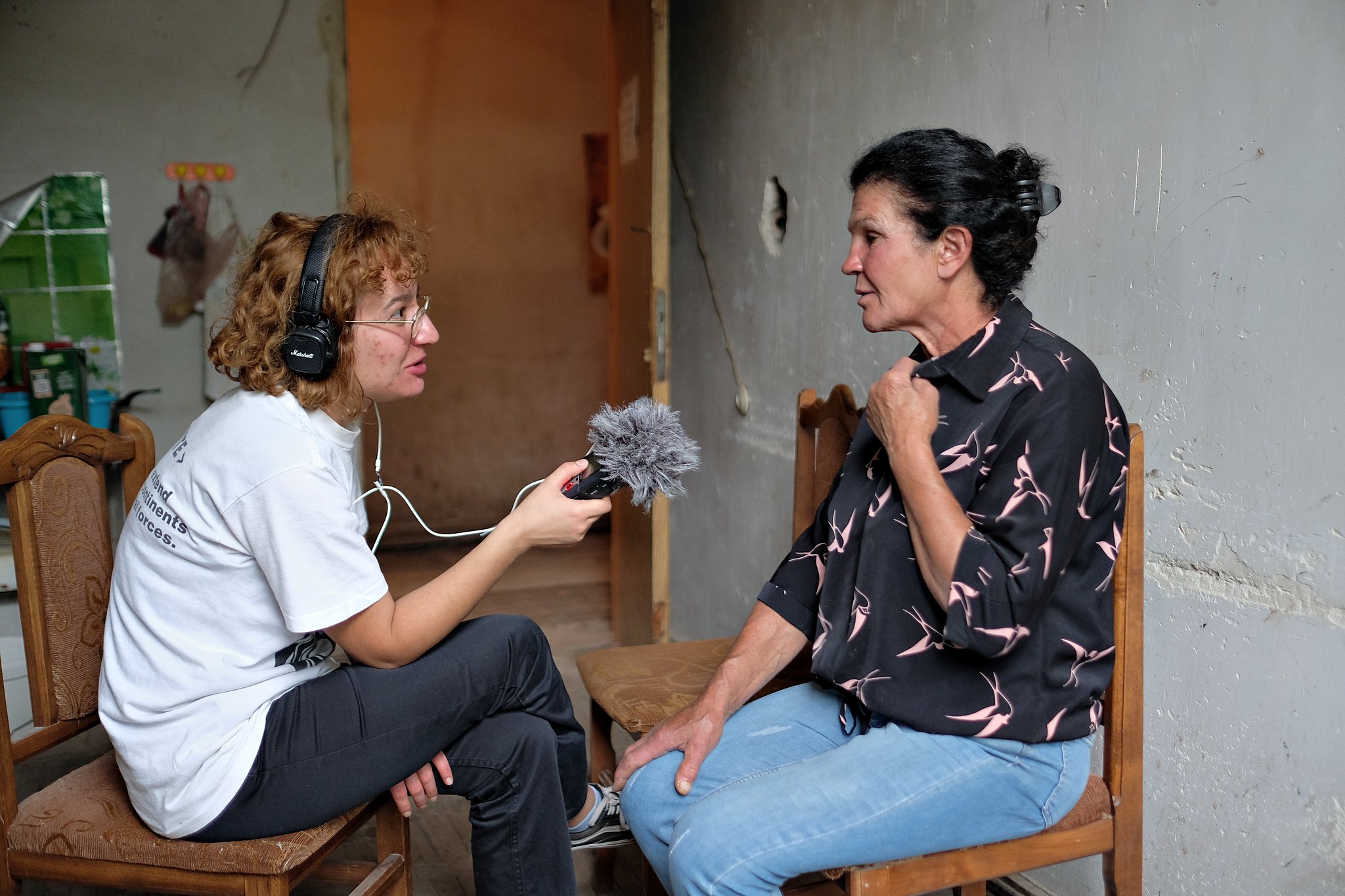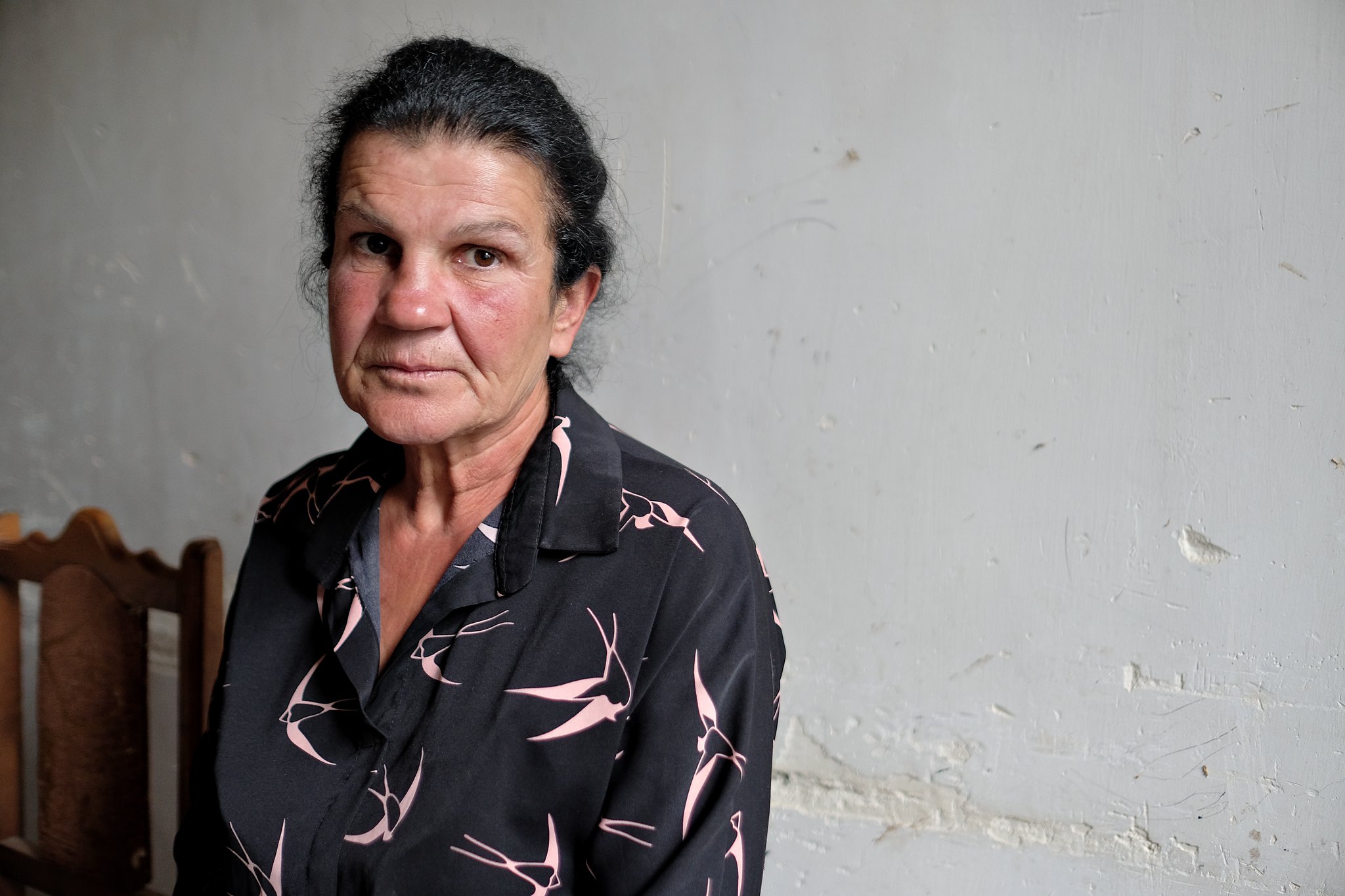Elena and Anahit are two sisters living in Berd, that’s a town in the Tavush Region of north eastern Armenia, abutting the border with Azerbaijan. They are gatherers. They gather berries from the mountains to sell to support their families. We met them in the Women support center in the town of Berd in September 2021. That was the end of the berry season, and the sisters were just back from one of the last gathering trips. They looked exhausted, and on needles, because they needed to be back home to store the days’ harvest. Anyway, they met our request to tell us about the berry story, and soon were so carried away by it, thay their tiredness left their face, and eyes got shiny. Wild blueberries have grown in this region here for centuries, the locals never thought they could actually eat them; some even thought the berries were poisonous, some didn’t know them at all-indeed, you’d have to climb 3000 meters just to reach them.
The sisters not only discovered these berries, they taught people what to do with them. Since then, the wild blueberry has been the brand of the town.
One time we were walking back to town, a guy pulled over on the road and offered us a ride. And the driver asked us, “Do you know that on the Mrghuz mountain steppes there are Mlmla? That’s the local word for wild blueberries.”
“What is mlmla?” we asked. “It grows on the mountain slopes”, he said.
So we asked around; nobody knew what it was.
Eventually we went to the mountain and there was an old man at the bottom of the mountain. He was sick in bed and his ribs were broken; but he was able to raise his finger to point the way: “Go this way, you have to go up this much, that far.” We reached the bushes at 2 pm. I was first to see the fruits. We gathered them one by one by hand—the little berries. We brought them back home, but we didn’t know what they were. Yes, they were tasty, we would savor them, but we did not sell yet.
But then we heard from somebody about a Ukrainian visiting here who said that these berries are called chernika, blackberry. He gathered some, but he couldn’t persuade people to buy any for 500 dram, so he gave up the endavor.
So we decided to promote the chernika. I went from one festival to another, shouting “berries! chernika!” so much that I ran out of breath. I’d say their nurturing effect is to balance the organism, and to raise the immune system.
We knew there was a tool out there to gather berries – something like a comb. That tool was too expensive. So we’d substitute a hair-comb; we would place a bowl under the bush, and comb the bush to harvest.
One time we got lost in the mountains, and were in a hurry home, before dark. But we discovered a full bush of berries. I quickly gathered berries, but did not get rid of the leaves. I brought them home, put them on the window-sill, to later separate the full fruits from the leaves. A wind blew and the leaves got pulled out. So we thought, why don’t we do the cleaning with a fan? Now, everyone has their own comb and fan.
My sister and I set a market minimum for berries. We agreed not to sell for less than 2000 AMD for a kilo. Some years, we even had 3000 AMD for a kilo. It’s more expensive in Yerevan.
The Mrghus mountain is like a magnet. It pulls you to itself, no matter how tired you are, you don’t feel tired on the mountain.You look at it, you get scared, “how am i going to climb so much ?” you think. It’s 3000 meters high. It is a difficult landscape, one gets lost in it. We have no security measures on us. Even if you have a knife, we can’t do anything with it if a bear attacks you. The bear can go down and up fast, but not on uneven terrain. If you see a bear, we need to find an uneven terrain to run away. One time I saw a light grey-colored bear. I didn’t know such colored bears existed. I ran to the top of the mountain, as fast as I could. I reached the top in 15 minutes.
One time I got lost and I did leave traces like Hansel and Gretel. But I lost the traces, I had to find the way back by intuition.
I managed to provide good schooling to my four children by gathering in nature. I almost never had a job in an office. When the berries are over in late September, the nut season starts. Except for when a snow carpet covers the mountain, you can always find something in nature. It’s like a conveyor, everything has a ripe time, you need to catch the time, all too late.
One time I applied for a job as a cleaner. I went to work only once. I couldn’t be in the office. One time I worked as a cook in a military kitchen; I couldn’t take it either. I need to have more space and freedom. Mrghuz mountain provides that. It’s a primordial pleasure- to find something on your own. It’s very human to benefit from nature, our ancestors were hunters, that relation with nature shows in this collectionner way in me and my sister.
The roles of women and men are blurred now. The men don’t feel any responsibility to be the bread-winner of the family. The women do, they do either commerce, or cultivate their garden, etc. When I return from the mountain, I see idle men standing on the sidewalk. I want to smash them in the face for being so lazy.
In Berd a lot of people migrate to Russia. Some have visa problems and can’t go. Those who work in the military, are serving overnight. They spend their salary on food. It’s very difficult. Gradually we got stuck in these dire difficulties, being out of everybody’s sight. The situation got worse and worse. My daughter has lived in the US—she won a contest. She came back and couldn’t live here any more, and was in depression. She said, “if only you knew what a life people live in the US!”
This town was always cut off from roads, during the Soviet-times, too.
I have a three- room apartment in Yerevan. You would ask, why don’t I live in the city? The answer is, in the city I would always see the gap between rich and poor life. Here, in Berd, everyone’s living standards are alike. I even feel rich here, I sell herbs,I earn money. When I go for a visit to Yerevan, I get stressed; I can’t have that predicament all the time. I don’t go to any stores either. When I do, I see expensive nice things, and it makes me angry that I can’t buy those. I suffer.
My spirit is fine, I have harmony inside myself. Nature takes care of everything.
Knar Khudoyan, Ani Tadevosyan
Photos by Eliza mkhitaryan
This is the first episode in the ‘Borderland stories’.
 Epress.am News from Armenia
Epress.am News from Armenia



